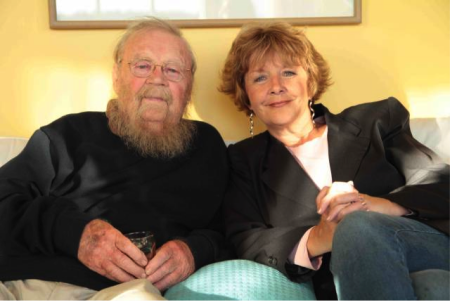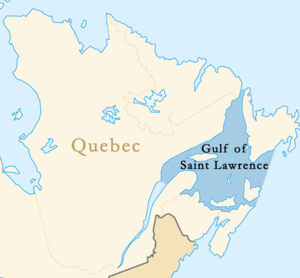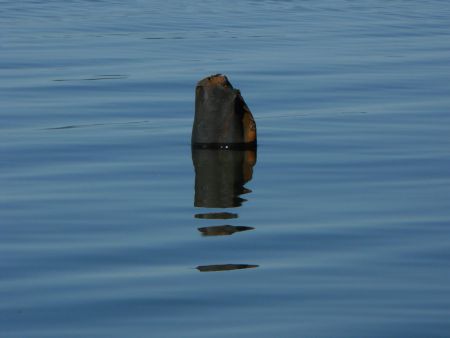K'JIPUKTUK (Halifax) - Mary Gorman think she knows why it is difficult to get people to pay attention to the perils of offshore oil and gas exploration.
"It's like my husband used to say when he still fished," says Gorman. "He'd go out, he'd haul traps, he'd come in at the end of the day, and look behind him at that vast ocean, and it would be as if he hadn't been there at all."
Gorman is a spokesperson for the Save our Seas and Shores coalition (SOSS), a group that wants a ban on all oil and gas activities in the Gulf of St. Lawrence.
Gorman understands that oil exploration can cause a lot of damage, no matter how vast that ocean may seem.
And she knows that although it may be difficult to get people to pay attention, it can be done.
It just takes patience, stamina, and a real knack for getting the message out.
The Save our Seas and Shores coalition formed in the late nineties, after the Canada Nova Scotia Offshore Petroleum Board (CNSOPB) awarded two inshore oil exploration licenses.
One license was situated in the Gulf of St. Lawrence. Both licenses were close to the shores of the Cape Breton Highlands National Park.
Too close for comfort, as it turned out.
Risk of spills caused an outcry among fishermen, First Nations, tourism operators and environmentalists. Public hearings were held, reports were published, the companies withdrew and the leases expired.
Mary Gorman and the Save our Seas and Shores coalition were instrumental in galvanizing the opposition.
At this time there are no plans to re-open the Nova Scotia sector of the Gulf of St. Lawrence to the oil and gas industry.
But for Gorman, when it comes to the Gulf of St. Lawrence, a battle won in Nova Scotia only goes so far.
"The way the Gulf of St Lawrence flushes like a toilet," Gorman says when asked what message a story on the Gulf should convey first and foremost.
Water originating at the Great Lakes and brought to the Gulf via the St Lawrence River doesn't just exit neatly into the Atlantic Ocean. Like a flushing toilet it swirls and it moves around.
What that means is that all five provinces bordering the Gulf of St. Lawrence could be affected were an oil spill to happen anywhere in the Gulf.
And a victory for environmentalists in Nova Scotia is only a partial victory as long as Québec, Newfoundland or any other province continue to engage in oil exploration in the Gulf of St. Lawrence.
Old Harry
If drilling is to occur anytime soon it will most likely happen in an area in the Gulf known as Old Harry, about 80 kilometers east of the Magdalen Islands and right on the cusp of the territorial boundary between Québec and Newfoundland.
The area is believed to contain 2 billion barrels of oil, which makes it almost twice the size of the Hibernia oil field. It also holds 7 trillion cubic feet of natural gas.
Forces in both Québec and Newfoundland are pushing hard to open the area up for exploration.
Any day now we may see the release of the Strategic Environmental Assessment for the Newfoundland sector of Old Harry.
The assessment is initiated by the Canada Newfoundland and Labrador Offshore Petroleum Board (CNLOPB), a joint federal-provincial body that regulates the offshore oil and gas industry.
The assessment will provide a framework for oil exploration in the Newfoundland sector of the Gulf of St. Lawrence.
Bob Diamond, a Newfoundland environmentalist, has little confidence in the CNLOPB. In 2007 it approved some oil exploration on Shoal Point, on the west coast of Newfoundland and not that far from where he lives.
A couple of years later, after drilling a dozen or so test wells, the company pulled up stakes and left.
What the CNLOPB did not consider at the time was coastal erosion. Local people fear that the new wells will share the fate of earlier drilling wells in as little as five to ten years.
These older drilling pipes, once firmly situated on land, are jutting vertically out of the ocean. There are reports of oil leaking into the ocean, and fishermen are alarmed about declines in scallop catches, sea urchins and rock crab.
As far as the strategic environmental assessment is concerned, Diamond believes that there is a fundamental flaw in the process, no matter what the framework will look like once revealed.
Any kind of environmental assessment needs to get away from a narrrow provincial approach and look at the big picture, Diamond says.
"After all, marine and coastal ecosystems don't care about provincial boundaries."
Indeed, an Environment Canada report establishes that a spill in the Newfoundland sector of Old Harry would likely affect the Southwest coast of Newfoundland and Cape Breton.
Simulations developed by the David Suzuki foundation indicate that oil spills could affect all five provinces bordering the Gulf.
And a report by the federal department of Fisheries and Oceans describes a Gulf of St. Lawrence already under considerable stress from hypoxia (a lack of oxygen), acidification, and many other pressures.
Nonetheless, in Québec, just as in Newfoundland, politicians are sorely tempted to fill provincial coffers with oil and gas revenue from the Gulf of St. Lawrence.
Just this month Québec embarked on a joint venture with Corridor Resources to frack for oil and gas on Anticosti Island, a very large but sparsely populated island at the mouth of the St. Lawrence River. Environmentalists are upset.
But those Antcosti Island activities are to occur on land. Oil and gas exploration offshore in the Gulf is a different matter.
Once again Old Harry is the most prominent target. But in Québec there are some hurdles.
An accord defining joint management of the Gulf between Québec and the Federal Government needs to be ratified by the two legislatures. A boundary dispute with Newfoundland also needs to be resolved.
As well, a recently completed Strategic Environmental Assessment (SEA) defines the conditions that need to be met for offshore drilling to occur.
Sylvain Archambault, spokesperson for the St Lawrence Coalition, another organization that wants to protect the Gulf, believes that the strategic assessment sets the bar quite high.
"The Strategic Environmental Assessment points out that there is a lot we don't know about the Gulf's ecology," Archambault tells the Halifax Media Co-op. "It also identifies all kinds of other issues. For instance, we don't know what to do if a spill were to occur, especially when there is ice present, a whole lot of things like that."
In fact, the Québec SEA warns that if exploration were to happen an accident like the one witnessed in the Gulf of Mexico in 2010 would be "plausible". It could happen.
Nonetheless, Archambault thinks that Québec politicians will do what they can to find a way around these obstacles. Already businessmen and politicians are urging the Parti Quebecois government to hurry up and start drilling already.
The opposition
Opposition to development of Old Harry in Newfoundland is somewhat fragmented at this time.
Diamond believes the immediate threat of hydraulic fracking on land is keeping Newfoundland environmentalists preoccupied.
But Québec is a different matter. Archambault believes opposition to oil and gas exploration in Québec is strong.
The four major trade unions in Québec are calling for a moratorium in the Gulf of St. Lawrence, all the more impressive because many of their members work in the the oil and gas industry.
And a new alliance among Innu, Maliseet and Mi'gmaq lets it be known that First Nations in Québec intend to take their role as guardians seriously and make their never-surrendered treaty rights count.
Salmon fisheries are vital to many of the First Nations communities among the Gulf and concerns around oil spill damage are huge.
Chief Claude Jeannotte of the Mi’gmaq community of Gespeg, is a spokesperson for the First Nations coalition.
“The gulf is a unique and fragile area,” said Jeannotte in a press release. “Our peoples have depended on it since time immemorial and we will not allow the government of Québec to destroy it.”
Mary Gorman wishes her beloved Gulf of St. Lawrence would one day soon be free from the threat of oil and gas development.
"I am so fed up with the irresponsibility of our business CEOs and our government leaders," says Gorman.
"They don't protect the public interest and they narrow their roles to be simply promoters of business development. They are willing to throw protection of our air, water and global food supplies to the wolves."
Note: An arlier version of this article stated that the drilling wells now under water date back to 2007. This was incorrect. They are much older than that.
Follow Robert Devet on Twitter @DevetRobert
See also:
Drilling for oil off the coast of Nova Scotia
Offshore seismic testing puts wildlife at risk, biologist fears





